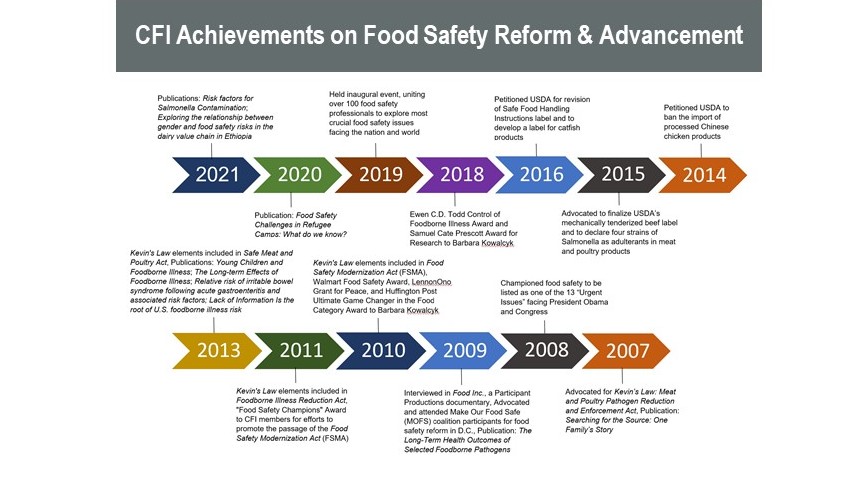Thanks for visiting!
Although our giving page is no longer active, you can still donate. If you would like to provide any additional support, please do so here.
Center for Foodborne Illness Research and Prevention 2021 Campaign
Although our giving page is no longer active, you can still donate. If you would like to provide any additional support, please do so here.
As a parent, one often has expectations and dreams of who their child will become and what they will achieve in their lifetime. This was the same for the parents of Kevin Kowalcyk, who should be celebrating his 23nd birthday on December 10th. In 2001, Kevin died from complications due to an E. Coli O157:H7 infection; he was only 2 ½ years old. For Kevin’s family, this left them with a plethora of unanswered questions, but a relentless desire to seek answers and better understand the food industry and food safety disciplines. Fueled by his passing, Barbara Kowalcyk, Kevin’s mother, and grandmother, Patricia Buck devoted their careers to preventing others from getting sick or dying from contaminated food and promoting stronger food safety policies and practices that protect public health.
The Center for Foodborne Illness Research and Prevention (CFI) was founded as a non-profit organization by Kowalcyk and Buck in 2006 with the aim to facilitate, encourage, and promote research on food safety; translate and communicate science and its implications for food safety to stakeholders; and work to implement a stronger, more science-based food system that prevents foodborne diseases on behalf of consumers. In 2019, Kowalcyk joined the faculty at The Ohio State University and brought CFI to the College of Food, Agricultural, and Environmental Sciences. Kevin’s story continues to invigorate and remind us all, as individuals, of the importance of food safety and preventing foodborne illness.
Over the past 20 years, CFI has helped bring important food safety reforms, improved regulatory inspection practices, and earned a reputation as a leader in food safety. Among its many contributions, CFI collaborated with other groups to develop, pass and implement the Food Safety Modernization Act of 2010 (FSMA), which was the first major overhaul of food safety oversight at the U.S. Food and Drug Administration in more than 70 years. CFI also joined multiple efforts to strengthen government resources for national and state food safety programs, and led an effort to require mandatory labeling of mechanically tenderized beef products, which have been associated with foodborne illnesses. In 2002, Kevin’s Law was introduced as the Meat and Poultry Pathogen Reduction and Enforcement Act to the House of Representatives. Although it did not pass, elements of Kevin’s Law have been incorporated in different legislatures throughout the years: FMSA of 2010, Foodborne Illness Reduction Act of 2011, and Safe Meat and Poultry Act of 2013. If Kevin's Law had passed, the United States would be much further along in controlling/preventing foodborne diseases, especially Salmonella, which is the country’s largest foodborne killer.
Foodborne illness is a serious public health issue that causes an estimated 600 million illnesses and 420,000 deaths globally each year. CFI’s mission is to advance a more scientific, risk-based food safety system that prevents these illnesses and protects public health by translating science into policy and practice. Much positive social change has already resulted through years of tireless commitment to bring about food safety reform and advancement at CFI; however, there is still much more to accomplish in the food safety industry. Please, consider contributing to CFI’s fight towards achieving food safety advancements and reform by making a donation or joining the CFI Food Safety Consortium. This will provide further funding for CFI to support student experiential learning opportunities, on-campus events, purchase research supplies, continue statistical software subscriptions, travel to domestic and international food safety meetings, and much more. We thank you very much for your support!
Happy Birthday, Kevin!
Check out our food safety research projects on the CFI website: foodsafety.osu.edu.
$23
Kevin's Birthday
Kevin Kowalcyk should have celebrated his 23rd birthday this year.
$48
Foodborne Illnesses per year
Each year, there are an estimated 48 million foodborne illnesses per year in the United States.
$77.70
Cost of Foodborne Illness
According to Ohio State researchers, foodborne illness costs an estimated $77.7 billion dollars per year in the United States.
$128
Number of Hospitalizations
Each year, an estimated 128,000 Americans are hospitalized due to foodborne illness.
$420
Number of deaths
The World Health Organization estimates that 420,000 people die each year globally from foodborne disease and 1/3 of these deaths occur in children.
$600
Number of Illnesses
An estimated 600 million people are sickened globally each year by foodborne pathogens. Africa and South-east Asia carry most of the burden.





